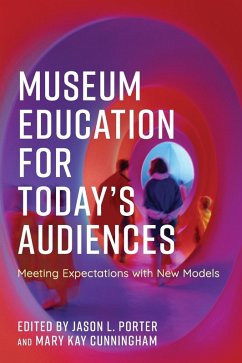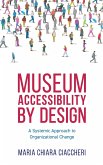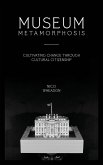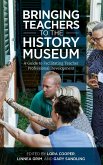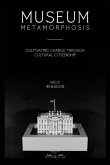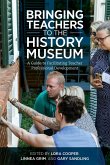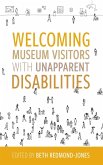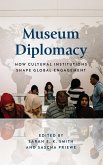Museum Education for Today's Audiences
Meeting Expectations with New Models
Herausgeber: Porter, Jason L.; Cunningham, Mary Kay
Museum Education for Today's Audiences
Meeting Expectations with New Models
Herausgeber: Porter, Jason L.; Cunningham, Mary Kay
- Gebundenes Buch
- Merkliste
- Auf die Merkliste
- Bewerten Bewerten
- Teilen
- Produkt teilen
- Produkterinnerung
- Produkterinnerung
This book will help museum educators meet visitors’ changing expectations, train and prepare responsive educators, and develop models for the future
Andere Kunden interessierten sich auch für
![Museum Accessibility by Design Museum Accessibility by Design]() Maria Chiara CiaccheriMuseum Accessibility by Design92,99 €
Maria Chiara CiaccheriMuseum Accessibility by Design92,99 €![Museum Metamorphosis Museum Metamorphosis]() Nico WheadonMuseum Metamorphosis102,99 €
Nico WheadonMuseum Metamorphosis102,99 €![Bringing Teachers to the History Museum Bringing Teachers to the History Museum]() Bringing Teachers to the History Museum78,99 €
Bringing Teachers to the History Museum78,99 €![Museum Metamorphosis Museum Metamorphosis]() Nico WheadonMuseum Metamorphosis44,99 €
Nico WheadonMuseum Metamorphosis44,99 €![Bringing Teachers to the History Museum Bringing Teachers to the History Museum]() Bringing Teachers to the History Museum39,99 €
Bringing Teachers to the History Museum39,99 €![Welcoming Museum Visitors with Unapparent Disabilities Welcoming Museum Visitors with Unapparent Disabilities]() Welcoming Museum Visitors with Unapparent Disabilities110,99 €
Welcoming Museum Visitors with Unapparent Disabilities110,99 €![Museum Diplomacy Museum Diplomacy]() Sarah E. K. SmithMuseum Diplomacy132,99 €
Sarah E. K. SmithMuseum Diplomacy132,99 €-
-
-
This book will help museum educators meet visitors’ changing expectations, train and prepare responsive educators, and develop models for the future
Produktdetails
- Produktdetails
- Verlag: American Alliance Of Museums
- Seitenzahl: 314
- Erscheinungstermin: 15. Februar 2022
- Englisch
- Abmessung: 260mm x 183mm x 21mm
- Gewicht: 788g
- ISBN-13: 9781538148594
- ISBN-10: 1538148595
- Artikelnr.: 62475628
- Herstellerkennzeichnung
- Libri GmbH
- Europaallee 1
- 36244 Bad Hersfeld
- gpsr@libri.de
- Verlag: American Alliance Of Museums
- Seitenzahl: 314
- Erscheinungstermin: 15. Februar 2022
- Englisch
- Abmessung: 260mm x 183mm x 21mm
- Gewicht: 788g
- ISBN-13: 9781538148594
- ISBN-10: 1538148595
- Artikelnr.: 62475628
- Herstellerkennzeichnung
- Libri GmbH
- Europaallee 1
- 36244 Bad Hersfeld
- gpsr@libri.de
Jason L. Porter is the Kayla Skinner Deputy Director for Education and Public Engagement at Seattle Art Museum. Previously, he served as the director of education + Programs at MoPOP (Museum of Pop Culture) in Seattle, as director of education and public engagement at the San Diego Museum of Man (now Museum of Us) and associate director of education at the Skirball Cultural Center in Los Angeles. His work focuses on experiential education and public programs that serve community, school, family, and teacher audiences and on using the arts as a vehicle for personal transformation and social change. Prior to entering the museum field, he was a public school teacher. He received a B.A. in English from Tufts University, an M.A. in Education from Seattle University, and an Ed.D from UCLA. His dissertation examined charter schools meeting the needs of special education students. Professional development activities have included presentations at conferences including AAM, CAM, and WMA, serving as a mentor to emerging museum professionals and teaching as a guest lecturer in a number of museum studies programs. He has been a board member of AAM's Education Professional Network (EdCom) from 2014 through 2016, a jurist with the Excellence in Exhibitions competition in 2017 and 2018, a grants reviewer for IMLS in 2018, and a member of the peer review board of the Journal of Museum Education (JME) since 2016. In the last 25+ years, Mary Kay Cunningham has served over 35 different cultural institutions or attractions in the diverse roles of consultant, manager, museum educator, volunteer coordinator, and docent. She founded Dialogue Consulting in 2001 to support institutions improving their visitor experience through inclusive and collaborative interpretive planning, programming, and professional development. Her passion for facilitating group learning that brings together staff, volunteers, and communities to navigate institutional change is the hallmark of her work. Mary Kay is the author of The Interpreters Training Manual for Museums that guides front line staff in facilitating meaningful learning conversations with visitors. As a professed learning addict, she pursues and support professional development in the field by serving on the editorial board of The Journal of Museum Education since 2010, creating and instructing a graduate-level course on Visitor Experience design at the University of Victoria, B.C. since 2013, and presenting over 45 sessions or workshops in the last 20 years for professional meetings including AAM, APGA, ASTC, CAM, NAI, and WMA.
Table of Contents
Preface
Acknowledgements
Introduction by Dina Bailey
Part I: Changing Expectations of Visitors: Inclusion, Participation,
Technology
Building Community and Structural Competency Through Art: An Art Museum and
Psychiatry Partnership by Theresa Sotto, Hallie Scott, Enrico
CastilloChanging the Educational Landscape: School & Museum Partnerships
for the 21st Century by Veronica Alvarez, Sarah Jenks, Catherine Awsumb
Nelson, Elisabeth GerberThe Spectrum Project: Social Stories, Museum
Educators, and Young Adults with Autism by Beth Redmond-JonesDigital Pivot:
Digital Decisions to Accelerate the Momentum Among Art Institutions to
Evolve, Change, and Adapt by Mark OstermanPart II: Training and Educator
Preparation
Training for the Rainbow: Preparing Educators to be LGBTQ-Inclusive by Mac
BuffBuilding a Better World: Rethinking a Museum's Civic Engagement Model
by Rachel Stark, Anna SchwarzFacilitating Family Learning in Museums:
Re-Thinking our Assumptions and Approaches by Scott Pattison, Smirla
Ramos-MontanezMuseum Studies Programs: A Conversation about the Future by
Jason Porter, Mary Kay CunninghamCreating Empowered Educators by Lorie
MilwardCultivating a New Mindset for Professional Development by Beth
MaloneyPart III: New Models, Anticipating the Future
Building Bridges: The Need for Cultural Competence in the Museum Field by
Teresa Williams ValenciaThe New Children's Museum: Innovating Ways to
Support Today's Children by Tomoko KutaSee the System and Be Problem
Specific: Human-Centered Design and Improvement Practices for Engagement
and Inclusion by Julie SmithThe brain science of museum learning by Jayatri
Das, co-author Mickey MaleyNo Longer Business as Usual: Reconstructing
Relevancy through Critical Race Theory by Melanie Adams, Kayleigh
Bryant-GreenwellThe Impact of COVID19 on the Field of Museum Education by
Juline ChevalierEducators with Lived Experience: Lessons Learned from the
Learned by Lauren Zalut, Sean KelleyIndex
About the Editors and Contributors
Preface
Acknowledgements
Introduction by Dina Bailey
Part I: Changing Expectations of Visitors: Inclusion, Participation,
Technology
Building Community and Structural Competency Through Art: An Art Museum and
Psychiatry Partnership by Theresa Sotto, Hallie Scott, Enrico
CastilloChanging the Educational Landscape: School & Museum Partnerships
for the 21st Century by Veronica Alvarez, Sarah Jenks, Catherine Awsumb
Nelson, Elisabeth GerberThe Spectrum Project: Social Stories, Museum
Educators, and Young Adults with Autism by Beth Redmond-JonesDigital Pivot:
Digital Decisions to Accelerate the Momentum Among Art Institutions to
Evolve, Change, and Adapt by Mark OstermanPart II: Training and Educator
Preparation
Training for the Rainbow: Preparing Educators to be LGBTQ-Inclusive by Mac
BuffBuilding a Better World: Rethinking a Museum's Civic Engagement Model
by Rachel Stark, Anna SchwarzFacilitating Family Learning in Museums:
Re-Thinking our Assumptions and Approaches by Scott Pattison, Smirla
Ramos-MontanezMuseum Studies Programs: A Conversation about the Future by
Jason Porter, Mary Kay CunninghamCreating Empowered Educators by Lorie
MilwardCultivating a New Mindset for Professional Development by Beth
MaloneyPart III: New Models, Anticipating the Future
Building Bridges: The Need for Cultural Competence in the Museum Field by
Teresa Williams ValenciaThe New Children's Museum: Innovating Ways to
Support Today's Children by Tomoko KutaSee the System and Be Problem
Specific: Human-Centered Design and Improvement Practices for Engagement
and Inclusion by Julie SmithThe brain science of museum learning by Jayatri
Das, co-author Mickey MaleyNo Longer Business as Usual: Reconstructing
Relevancy through Critical Race Theory by Melanie Adams, Kayleigh
Bryant-GreenwellThe Impact of COVID19 on the Field of Museum Education by
Juline ChevalierEducators with Lived Experience: Lessons Learned from the
Learned by Lauren Zalut, Sean KelleyIndex
About the Editors and Contributors
Table of Contents
Preface
Acknowledgements
Introduction by Dina Bailey
Part I: Changing Expectations of Visitors: Inclusion, Participation,
Technology
Building Community and Structural Competency Through Art: An Art Museum and
Psychiatry Partnership by Theresa Sotto, Hallie Scott, Enrico
CastilloChanging the Educational Landscape: School & Museum Partnerships
for the 21st Century by Veronica Alvarez, Sarah Jenks, Catherine Awsumb
Nelson, Elisabeth GerberThe Spectrum Project: Social Stories, Museum
Educators, and Young Adults with Autism by Beth Redmond-JonesDigital Pivot:
Digital Decisions to Accelerate the Momentum Among Art Institutions to
Evolve, Change, and Adapt by Mark OstermanPart II: Training and Educator
Preparation
Training for the Rainbow: Preparing Educators to be LGBTQ-Inclusive by Mac
BuffBuilding a Better World: Rethinking a Museum's Civic Engagement Model
by Rachel Stark, Anna SchwarzFacilitating Family Learning in Museums:
Re-Thinking our Assumptions and Approaches by Scott Pattison, Smirla
Ramos-MontanezMuseum Studies Programs: A Conversation about the Future by
Jason Porter, Mary Kay CunninghamCreating Empowered Educators by Lorie
MilwardCultivating a New Mindset for Professional Development by Beth
MaloneyPart III: New Models, Anticipating the Future
Building Bridges: The Need for Cultural Competence in the Museum Field by
Teresa Williams ValenciaThe New Children's Museum: Innovating Ways to
Support Today's Children by Tomoko KutaSee the System and Be Problem
Specific: Human-Centered Design and Improvement Practices for Engagement
and Inclusion by Julie SmithThe brain science of museum learning by Jayatri
Das, co-author Mickey MaleyNo Longer Business as Usual: Reconstructing
Relevancy through Critical Race Theory by Melanie Adams, Kayleigh
Bryant-GreenwellThe Impact of COVID19 on the Field of Museum Education by
Juline ChevalierEducators with Lived Experience: Lessons Learned from the
Learned by Lauren Zalut, Sean KelleyIndex
About the Editors and Contributors
Preface
Acknowledgements
Introduction by Dina Bailey
Part I: Changing Expectations of Visitors: Inclusion, Participation,
Technology
Building Community and Structural Competency Through Art: An Art Museum and
Psychiatry Partnership by Theresa Sotto, Hallie Scott, Enrico
CastilloChanging the Educational Landscape: School & Museum Partnerships
for the 21st Century by Veronica Alvarez, Sarah Jenks, Catherine Awsumb
Nelson, Elisabeth GerberThe Spectrum Project: Social Stories, Museum
Educators, and Young Adults with Autism by Beth Redmond-JonesDigital Pivot:
Digital Decisions to Accelerate the Momentum Among Art Institutions to
Evolve, Change, and Adapt by Mark OstermanPart II: Training and Educator
Preparation
Training for the Rainbow: Preparing Educators to be LGBTQ-Inclusive by Mac
BuffBuilding a Better World: Rethinking a Museum's Civic Engagement Model
by Rachel Stark, Anna SchwarzFacilitating Family Learning in Museums:
Re-Thinking our Assumptions and Approaches by Scott Pattison, Smirla
Ramos-MontanezMuseum Studies Programs: A Conversation about the Future by
Jason Porter, Mary Kay CunninghamCreating Empowered Educators by Lorie
MilwardCultivating a New Mindset for Professional Development by Beth
MaloneyPart III: New Models, Anticipating the Future
Building Bridges: The Need for Cultural Competence in the Museum Field by
Teresa Williams ValenciaThe New Children's Museum: Innovating Ways to
Support Today's Children by Tomoko KutaSee the System and Be Problem
Specific: Human-Centered Design and Improvement Practices for Engagement
and Inclusion by Julie SmithThe brain science of museum learning by Jayatri
Das, co-author Mickey MaleyNo Longer Business as Usual: Reconstructing
Relevancy through Critical Race Theory by Melanie Adams, Kayleigh
Bryant-GreenwellThe Impact of COVID19 on the Field of Museum Education by
Juline ChevalierEducators with Lived Experience: Lessons Learned from the
Learned by Lauren Zalut, Sean KelleyIndex
About the Editors and Contributors

